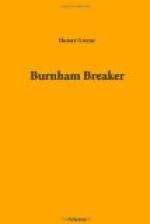The lady was sitting with her veil across her face, smiling now and then, wiping away a tear or two, listening carefully to catch every word.
Then the witness was turned over to the counsel for the defence, for cross-examination.
“What else has the boy done or said to make you think he is of gentler birth than his companions in the breaker?” asked Goodlaw, somewhat sarcastically.
“Why, the lad does na swear nor say bad words.”
“What else?”
“He’s tidy wi’ the clothes, an’ he wull be clean.”
“What else?”
“What else? wull, they be times when he says things to ye so quick like, so bright like, so lofty like, ‘at ye’d mos’ think he was na human like the rest o’ us. An’ ‘e fears naught, ye canna mak’ ’im afeard o’ doin’ what’s richt. D’ye min’ the time ’e jumpit on the carriage an’ went doon wi’ the rest o’ them to bring oot the burnit uns? an’ cam’ up alive when Robert Burnham met his death? Ah, mon! no coward chiel ’d ‘a’ done like that.”
“Might not a child of very lowly birth do all the things you speak of under proper training and certain influences?”
“Mayhap, but it’s no’ likely, no’ likely. Hold! wait a bit! I dinna mean but that a poor mon’s childer can be bright, braw, guid boys an’ girls; they be, I ken mony o’ them mysel’. But gin the father an’ the mither think high an’ act gentle an’ do noble, ye’ll fin’ it i’ the blood an’ bone o’ the childer, sure as they’re born. Now, look ye! I kenned Robert Burnham, I kenned ‘im weel. He was kind an’ gentle an’ braw, a-thinkin’ bright things an’ a-doin’ gret deeds. The lad’s like ’im, mind ye; he thinks like ’im, he says like ’im, he does like ’im. Truth, I daur say, i’ the face o’ all o’ ye, that no son was ever more like the father than the lad a-settin’ yonner is like Robert Burnham was afoor the guid Lord took ’im to ’imsel’.”
Bachelor Billy was leaning forward across the railing of the witness-stand, speaking in a voice that could be heard in the remotest corner of the room, emphasizing his words with forceful gesticulation. No one could for a moment doubt his candor and earnestness.
“You are very anxious that the plaintiff should succeed in this suit, are you not?” asked Goodlaw.
“I dinna unnerstan’ ye, sir.”
“You would like to have this boy declared to be a son of Robert Burnham, would you not?”
“For the lad’s sake, yes. But I canna tell ye how it’ll hurt me to lose ’im fra ma bit hame. He’s verra dear to me, the lad is.”
“Have you presented any bill to Ralph’s guardian for services to the boy?”
“Bill! I ha’ no bill.”
“Do you not propose to present such a bill in case the plaintiff is successful in this suit?”
“I tell ye, mon, I ha’ no bill. The child’s richt welcome to all that I ‘a’ ever done for ’im. It’s little eneuch to be sure, but he’s welcome to it, an’ so’s ‘is father an’ ‘is mother an’ ‘is gardeen; an’ that’s what I tellit Muster Sharpman ‘imsel’. An the lad’s as guid to them as ‘e has been wi’ me, they’ll unnerstan’ as how his company’s a thing ye canna balance wi’ gold an’ siller.”




